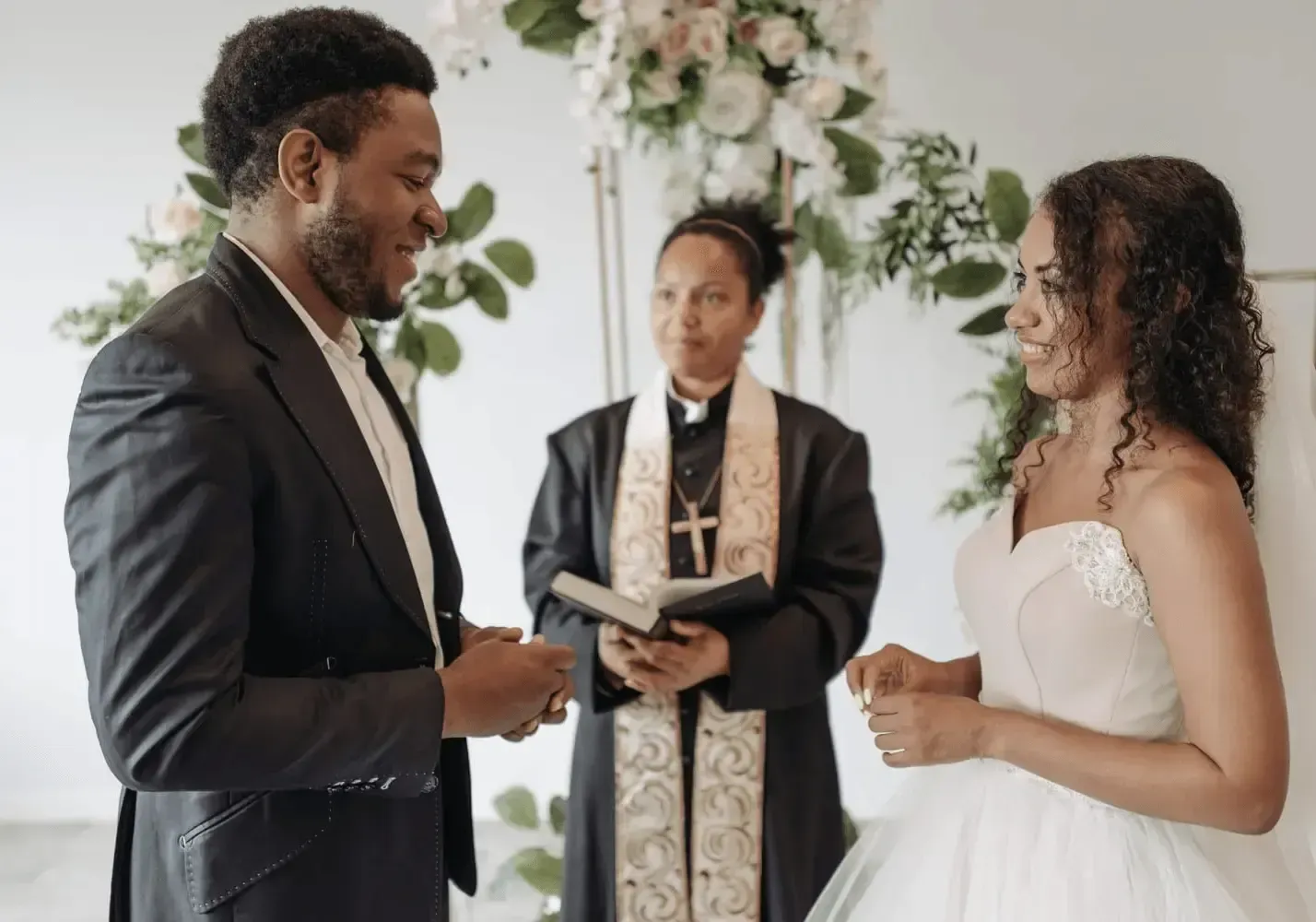How to Write Your Christian Wedding Vows
So writing your own vows is already stressful enough…
Now you’re trying to write Christian vows?
Whew.
Deep breath, babe.
Because now it’s not just
“I love you” and “you make me laugh when I’m sad”
You’re also trying to honour God, not sound awkward ...maybe sneak in a Bible verse (but not in a weird way), and still make it through without crying mid-sentence.
Yeah it’s a lot.
---
So...
if you’ve been staring at your blank Google Doc like,
“Holy Spirit …please take the wheel”
This post is for you.
Let’s break it down together.
First off: What are Christian vows, really?
Let’s get this straight before we write a single sentence.
Christian vows are not cute speeches with a Bible verse sprinkled on top.
They’re not “forever and always” quotes you saw on Pinterest.
...And they’re not supposed to sound like your pastor wrote them.
---
They’re promises.
Before God.
To love someone in a way that reflects Christ ...not just when it’s easy, but especially when it’s not.
And yes ...they should still sound like you.
Step 1: Don’t start with a verse. Start with you two.
This is gonna sound crazy, but please don’t open your Bible first.
I love Scripture.
You love Scripture.
But this is how we end up sounding like a women’s conference flyer.
---
So before you start quoting 1 Corinthians 13, just slow down and remember your relationship.
Literally ...grab a notebook or open your Notes app and answer these:
Ask yourself these questions:
What kind of spouse do I want to be?
What has God taught me about love so far?
What does faithful love look like to me ...especially in hard seasons?
How do I want to show up for this person emotionally, spiritually, and practically?
Write like no one’s going to read it but God.
This is your raw material.
Step 2: Think in promises, not poetry.
The word “vow” literally means “a solemn promise.”
That’s it.
You’re not writing a love letter. You’re not giving a speech.
You’re simply naming the things you want to promise ...clearly and truthfully.
---
So start listing out what you genuinely want to commit to in marriage.
Think about things like:
What are you committing to spiritually?
(e.g., keeping God at the center, praying together, choosing grace)
What are you committing to emotionally?
(e.g., showing patience, offering forgiveness, choosing love when it’s hard)
What are you committing to practically?
(e.g., communicating well, supporting their purpose, growing together)
---
Don’t worry about how it sounds yet.
Just focus on what’s true for you.
Step 3: Narrow it down to 3–5 clear promises
Once you have your list of thoughts and commitments, it’s time to shape them into actual vows.
Go back to everything you scribbled or journaled in Step 2.
Read through it slowly, and ask:
What do I really want to promise in this marriage?
.
.
-Not what sounds pretty.
-Not what people expect to hear.
What actually matters to you?
Now - pick your top 3 to 5.
Just the ones that hit deepest.
Then write them out as short, clear promises
---
It helps to start with something like:
“I promise to…”
“With God’s help, I will…”
“I commit to…”
Keep it simple.
Don't try to sound fluffy or poetic like a Pinterest quote.
This is you making a vow ...not a performance, not a poem.
Step 4: Invite God in - naturally.
Christian vows should absolutely reflect your relationship with God.
But that doesn’t mean they have to sound like a devotional.
---
You don’t need to quote a dozen verses.
You don’t need to sound like you’re writing a sermon.
You can invite God in with language that’s personal and true to where you are.
That might look like:
Starting a vow with “With God’s help…”
Mentioning how you want to seek Him together in marriage
Ending your vows with a Scripture that means something to you both
Acknowledging that you’ll fall short, and that grace will carry you
The goal isn’t to sound “holy.”
The goal is to speak honestly - as someone who knows she can’t do this without Jesus
Step 5: Read it out loud. Keep it short. Make it yours.
Once you’ve written your vows, read them out loud to yourself.
Do they sound like you?
Like something you’d actually say?
If anything feels too stiff or over-explained, change it.
You don’t need fancy language.
You just need sincerity.
--
And don’t overdo the length ... your vows should take 1–2 minutes tops when spoken slowly.
Anything longer, and you’ll start losing people (and probably lose your breath too).
Keep it short, grounded, and honest.
To Wrap it up...
Your vows don’t need to sound like a pastor wrote them.
They don’t need to go viral on TikTok.
They don’t even need to impress your guests.
They just need to be true.
Spoken in love.
Rooted in grace.
And offered with humility ...knowing you’re not doing this marriage thing by your own strength, but with God at the center.💗
Now...
if you enjoyed this blog post don't forget to **SAVE THIS PIN** so you can come back to it again later)

You’ve GOT to read this next...

Writing your vows but don’t want to sound cheesy or blank out at the altar? Here’s how to write wedding vows that actually sound like you

Your officiant does way more than just say “you may kiss.”
From setting the tone to keeping the ceremony flowing, this blog post breaks down why this vendor matters more than most couples realize ...and how to actually use them well.

Who stands where? ..Who walks when?
If you’ve ever wondered how the whole ceremony lineup actually works, this post breaks it down sooo clearly you’ll feel like a pro (without needing a planner).

Planning your ceremony is basically a whole collection of tiny decisions you don’t realize you need to make until someone asks you.
This post walks you through the surprisingly important choices you’ll want to sort out before the big day.

